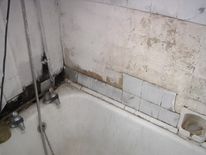Slums may be re-emerging in the UK, with growing concern about the number of private renters living in hazardous or squalid conditions.
A dramatic increase in the number of renters and poor regulation in the private sector, are being exploited by rogue landlords, according to local authorities and housing campaigners.
Many blame a diminishing stock of social housing and the continuing unaffordability of homes to buy for pushing growing numbers of people, including low income families and vulnerable people, into contracts with private landlords.
Sandrine Anterrion was homeless before she rented a flea-infested flat with no hot water or working toilet.
She had to refuse to give sexual favours to her landlord in exchange for rent and, when she eventually complained, she was evicted.
Sandrine Anterrion in her flea-infested flat
"I just had to sleep in the kitchen because there was no carpet there and I ended up sleeping on chairs for like three or four years, and falling over like every so often," she said.
"I also had no toilet for three years. If I needed to go I had to go to Asda and to the library.
"I think if an animal lived in those conditions, the RSPCA would have to come down and deal with it."
One third of privately rented homes are non-decent, meaning they fall below the basic standard of health, safety and habitability set by the UK government.
One in every six homes - or 740,000 - are physically unsafe, with severe hazards, including damp, cold, rodent infestation and the risk of falls and injury.
Yet rogue landlords are estimated to be receiving £5.6bn a year for renting out unsafe homes.
Matt Downie, director of policy at Crisis, said: "There is absolutely a housing crisis in this country.
"We are not building at the rate we need even to meet the demand we have now - let alone future need.
A undated photo of a slum interior in Colville Gardens, London
"What we see is that the housing developments popping up are not affordable to people with any chance of paying affordable rents."
Sky News accompanied Brent Council, police and immigration officers on a raid of a three-bedroom property being illegally rented out.
The raid found 17 men living in the house, with a bed in the kitchen, four in the front room and three in each bedroom.
In some cases, residents shared a single bed, with night workers swapping sleeping shifts with those who worked during the day.
The men said they were paying a total of £3,000 per month.
The bathroom of a house raided by council, officers, immigration and police
"There are some really dangerous issues in this property - such as electric insulation, there's no heating, there's no hot water, sanitation is a concern," said Spencer Randolph, head of private housing services at Brent Council.
"This is something we are coming across on a regular basis.
"We find that there are criminal landlords who are really exploiting vulnerable tenants such as these and charging extortionate rents for people to live in really poor housing conditions."
The private rental sector has dramatically increased in recent years with the decline in social housing and the unaffordability of homes to buy.
In the 1970s, social housing accounted for one third of the UK's housing stock but by 2013 that figure had decreased to 17%.
Betsy Dillner, director of campaign group Generation Rent, said: "Rents are going up and wages aren't.
"People still need to get to work, especially in high demand areas.
"Moving further away from the city is not an option because all that money you're saving on rent is just going to your train fare, so people are willing to take whatever they can get in their price range and that creates an opportunity for rogue landlords to exploit."
The new Housing and Planning Act acknowledges some of the problems in the private rental sector, introducing banning orders for rogue landlords and creating a blacklist to help prevent them from renting out properties.
But the Act also accelerates the sale of council and housing association properties, reducing an already dwindling stock of social housing which is likely to see more people entering the private rental sector.
The sector, previously dominated by young singles, is now half comprised of families.
A spokesman for the Department for Communities and Local Government said: "We're determined to create a bigger, better private rented sector that meets the needs of tenants and encourages investment in quality homes for rent.
"This includes cracking down on rogue landlords with more over 40,000 properties inspected and more than 3,000 landlords facing further enforcement action or prosecution."







